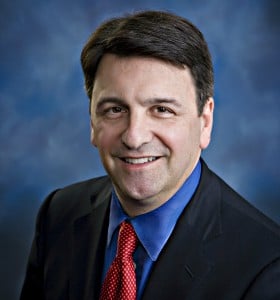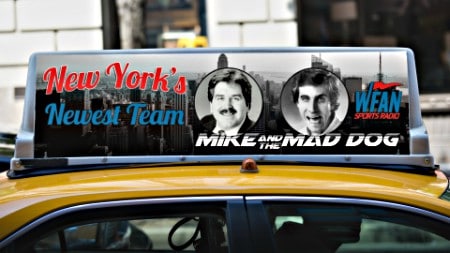
(By Andy Bloom) A recent episode of ESPN’s 30 for 30 paid tribute to the 30th anniversary of the launch of Sports radio on WFAN and to Mike Francesa and Chris “Mad Dog” Russo, who hosted arguably the most influential radio show in the history of the format. ESPN did a superior job of capturing the beginnings of the format, station, and show. This edition of 30 for 30 was more than just recognition of WFAN’s 30th anniversary or a tribute to Mike & The Mad Dog. The documentary was also a clinic on how to build and develop a tremendous radio program.
THE DEVELOPMENT, FAILURES, AND SUCCESS OF SPORTS RADIO
The father of Sports radio is Jeff Smulyan, CEO of Emmis Communications. Jeff, who first dreamed of the format in college, is a brilliant forward thinker. (Full disclosure: I’ve worked for Emmis and will add that Jeff is a fundamentally decent human being.) At Emmis, Jeff’s management team didn’t have faith in the concept. But loyal lieutenants, like then- Emmis President/Radio Programming Rick Cummings, another visionary programmer (and friend), wanted to help Jeff make this one dream come true, so they went along.
WFAN debuted on 1050 as part of Emmis’ acquisition of Doubleday. Then, when Emmis bought NBC Radio, WFAN was moved to the former 66 WNBC, a giant 50kw clear channel signal with the benefit of Don Imus’ cume in morning drive.
WFAN’s early years were not pretty. Despite the hiring of seasoned broadcast pros like Greg Gumbel, Jim Lampley, and Pete Franklin, ratings were low. Further, the station lost vast amounts of money.
Those interviewed on ESPN’s 30 for 30 were in consensus about the poor start, saying WFAN offered “people who didn’t sound like, think like New York, or even go to New York ball games.” Some mentioned the many outside interests the early crew had, which perhaps played some role in the initial failures.
I don’t believe the original WFAN lost because the air personalities weren’t native New Yorkers; Howard Stern had long destroyed the notion that local is necessary to win in radio. I do agree that Gumbel, Lampley, and Franklin didn’t share the same zeal for New York’s sports teams as the audience, and that is critical.
ESPN Radio affiliates covering sports nationally consistently lose to stations like WFAN and WIP/Philadelphia. WIP’s competition, WPEN, grew only after replacing ESPN daytime content with former WIP talent. (Apparently, ESPN’s New York affiliate is starting to come to the same conclusion.)
Localization is more important in Sports radio than in other formats, but alone, it doesn’t explain why the early WFAN lineup lost, and Mike & The Mad Dog won. True, Mike and Chris sound, speak, and act like the New Yorkers they are. But Russo is also a vocal San Francisco Giants baseball fan.
In Philadelphia, Angelo Cataldi and Al Morganti have dominated Sports radio for 27 years. Both came from Boston (Angelo via Providence). Al openly roots for the Red Sox, and Angelo was considered a Yankees fan for years (though he wasn’t vocal about it). It takes more than being from the city and a homer to win.
THE SECRET SAUCE: PASSION
In 30 for 30, Francesa nails the big picture with one quote: “We did opinionated, passionate sports talk. Do not discount passion.” Mike and The Mad Dog were highly emotional, fervent fans who talked about sports the same way their listeners did every day. In the documentary, sportscaster Jim Nance says, “I took the craziness to be a whole lot of passion.” So did listeners. That intensity, from joy to rage, is the biggest factor in Sports Talk, music radio, and even podcasting.
MANAGEMENT’S VISION & THE SHOTGUN MARRIAGE
WFAN’s then-program director Mark Mason brilliantly teamed Francesa and Russo. He had a vision, and the “stick-to-it-ive-ness” to see the idea through when few thought it would work.
It was a shotgun marriage: Mike and Chris were vocal about not wanting to work together. In 30 for 30, Francesa states, “At that time, I never thought Dog could stand up to me in a sports argument.” “Mike looked at me as baggage,” Chris concurred. “I had to prove I could handle this.”
Those were omens of a rocky start. Critics wrote that they should be split up. Mike and The Mad Dog openly agreed. Mason ignored the critics, listeners, and even Mike and Cris.
BUILDING A SHOW INTO AN ENSEMBLE
Without practice shows or planning discussions, it didn’t begin well. In the documentary, Mason recalls coming home after the first day and his wife asking how it went. He replied, “Terribly.” A week in, Mason even thought the show would lead to his dismissal.
While an ensemble usually implies a cast, there were just two established roles. Francesca sat in the lead chair. Russo opened the show with his trademark “Aaaanndd good afternoon…” He also ran the phones and brought the memorable moniker “Mad Dog.” Russo’s unique laugh also contributed to the show; a hearty laugher is a key ingredient in many programs.
But after the early turbulence, there was finally success. As Mason states, “Eventually, they became resigned to the fact they weren’t going to work separately.” Russo said, “Show after show I learned, and [Mike] learned how to coexist.” Mason was ultimately proven right.
Joel Hollander, WFAN’s general manager at the time, said, “Mike and Chris developed this chemistry that was contagious and explosive.” As mentioned, Chris was a San Francisco Giants fan and Mike a faithful Yankees fan, creating conflict and fun. The ratings skyrocketed, and the era of “good times” began. Sportswriter and broadcaster Tony Kornheiser sums up the period in 30 for 30: “They appeared to be intellectually equal, naturally antagonistic, and neither wanted the other to win [an argument].” While intense, the show was fun; in fact, Jeff Smulyan described the duo as “combative but likable.”
Mike Francesa said, “My relationship with Dog has always been questioned. Anyone who didn’t think we had fun had no idea … we had a ball.”
SMART GUYS WITH SMART PROGRAMMING LEADERSHIP
After Mark Mason had relinquished the programming chair, Mark Chernoff became the only other program director Mike & The Mad Dog ever had. Mike and Chris are remarkable talents, but give “Coach” Chernoff credit. He advised them as they developed the concepts that led to their mega-success, and was a factor in keeping them together for 19 years. Mark Mason and Chernoff demonstrate the value of extraordinary coaching. Some of their concepts:
The opening song: It was called “corny.” Maybe it was so bad that it was good. Theme songs and jingles work. Unconvinced? Call me, and I’ll have my 8-year-old sing you some of his favorite jingles.
Complete honesty:
Neither held back; they shared everything on the air. Chris’ late father, Tony, and Mike developed a terrific relationship. Mike openly discussed his brother’s suicide, and both talked about mundane everyday topics as well. Listeners regarded the guys as friends. They developed a real emotional bond with their audience, as most leading radio personalities do.
Understanding the role of the callers:
In 30 for 30, Francesa states, “Callers are different than listeners.” He and Russo recognized how not to play to callers, but use them to accomplish what Rush Limbaugh frequently points out: “The purpose of the callers is to make your humble host look good.” The documentary included a panel of three regular callers; one of them, “Mike from Montauk,” said, “The longer the call, obviously they thought it was a good call.”
Fearless but respectful interviews: In a clip from a show when they interviewed Alex Rodriguez, Mike and Chris asked why he didn’t leave the Yankees for a team where he’d be happier. A-Rod’s facial expression and body language suggested he wanted to make himself disappear. Mike and Chris conduct tough interviews, but they ask the questions listeners would ask if they could. Listeners describe most successful air talent that way: “They say what I think.”
They got people talking: In the 30 for 30 episode, several guests discussed frequently hearing people in the city talking about the show. It’s anecdotal, but when that happens, ratings usually follow. It doesn’t matter what people say about the personalities. Once, soon after introducing a controversial host,
I was waiting in a grocery checkout line. I overheard two women debating if this person should even have the right to breathe. The ratings exploded soon after. Once people are talking, be confident.
AND IN THE END
Once Mike and Chris regularly received monster ratings, they began to simulcast on TV and were soon among the most influential sports figures in New York. Those factors also, unfortunately, led to petty jealousies and their eventual breakup. They’ll always be my Beatles of Sports Talk radio — arguably the greatest ever, although other shows (more like the Rolling Stones), stuck together decades longer. We can only wonder what might have been if Mike Francesa and Chris Russo had been able to keep the act together for another 19 years.
Thank you, ESPN for a 30 for 30 that pays tribute to WFAN, Mike & The Mad Dog, and for producing a clinic on building great radio shows.
Andy Bloom is president of Andy Bloom Communications, specializing in talent coaching and development. Previously Bloom was operations manager for Talk Radio 1210 WPHT, and Sports Radio 94 WIP/Philadelphia, communications director for Rep. Michael R. Turner (R-OH), and VP of programming for Emmis International and Greater Media Inc. For more information his website is www.andybloom.com.







